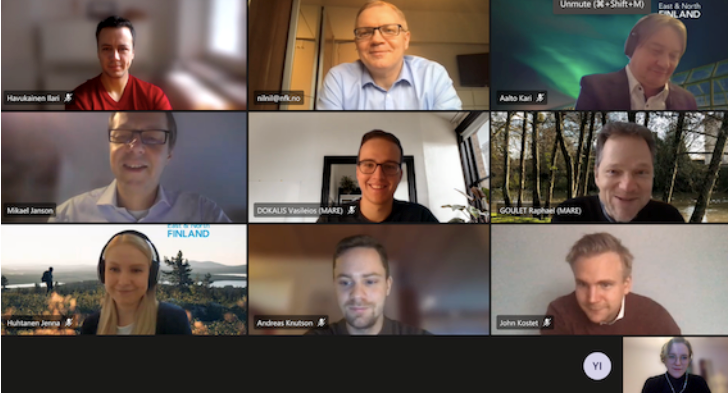NSPA in meeting with European Commission about the EU’s Arctic policy

On January 20, the network for Northern Sparsley Populated Areas (NSPA) held a meeting with the directorate-general for maritime affairs and fisheries (DG Mare) about the EU’s forthcoming Arctic policy.
The introductory discussion with Raphael Goulet, Iglika Yakova and Dokalos Vasileios from the directorate-general of the European Commission, DG Mare, was of great importance as the unit together with the European External Action Service, EEAS, are responsible for the revision of the integrated EU policy for the Arctic. The policy is under revision after the consultation that was carried out last fall, to which the NSPA collectively replied to. NSPA has during the fall 2020 had meetings with the EU Arctic ambassador Michael Mann. This time it was the European Commission’s turn to, through DG Mare, talk about their work in developing a proposal for an updated Arctic strategy for the EU.
NSPA’s views on the Arctic policy
The NSPA has been involved in the EU policy work for many years and therefore has a good dialogue with the European Commission. Initially, the Commission was told about the challenges the European Arctic are facing and why the commitment from home is so strong. The NSPA above all appreciates that the current Arctic policy is based on a strong focus on the EU contributing to sustainable development in the Arctic region. In the discussion of the current Arctic policy and what the NSPA would like to see in the upcoming policy, the NSPA emphasized the description of various proposals necessary to promote innovation and growth in the European Arctic. The NSPA does not want any restrictions regarding how the EU funds can be used in areas like forestry, energy and research.
The European green deal should be interconnected with the conditions, challenges and development opportunities of the region as the natural resources and knowledge within the region could be of even greater benefit to the EU in the ongoing green transition. It is therefore important to find a balance in the dialogue between the regions and the EU in what sustainable development is about; economic development for the benefit of the whole EU within the framework of sustainable ecological and climate-smart development. Regarding Arctic research and innovation, the NSPA wants to see a boarder definition than the current focus on Polar Research. The NSPA also wants better tools for targeting research in Arctic environments, which in turn could benefit test bed environments for the entire European Union.
The European Commission’s approach to the Arctic policy
Raphael Goulet, head of unit at DG Mare, began by thanking the NSPA for replying on the open consultation of the Arctic policy that the Commission initiated in the fall of 2020 and expressed his appreciation to the entire NSPA where he sees that there is a focus of working for a sustainable and green transition, which benefits the entire EU. He emphasized his positive view on the region having proven to be solution-oriented instead of self-pitying by focusing on solutions to regional challenges and closer cooperation across borders, even when dealing with challenges. As he previously had a role in the European Commission’s regional unit, he was familiar with the work of the NSPA even before being head of unit at DG Mare.
Goulet assured that the EU will not forget the Arctic nor the Arctic regions since there is a great deal of interest in the Arctic for the European Commission. It might be a bit far from Brussels, but the Arctic is close the Commissions other areas of interests. This was also demonstrated by the fact that the European Commission president Ursula von der Leyen, in her state of the Union, highlighted an updated Arctic policy as one of the priorities for the EU’s global work in the upcoming year. In conclusion, Goulet announced that the Commission was preparing to issue the conclusions of the Arctic consultation in the spring and that a major Arctic forum would be held in Brussels in the fall, following the EU Arctic forum that was held in Umeå 2019. He also requested the NSPA to give concrete examples of how the region works with sustainability and the green transition within the framework of the green deal, information that according to Goulet would be of value for the ongoing work.
/Julia Hanson
